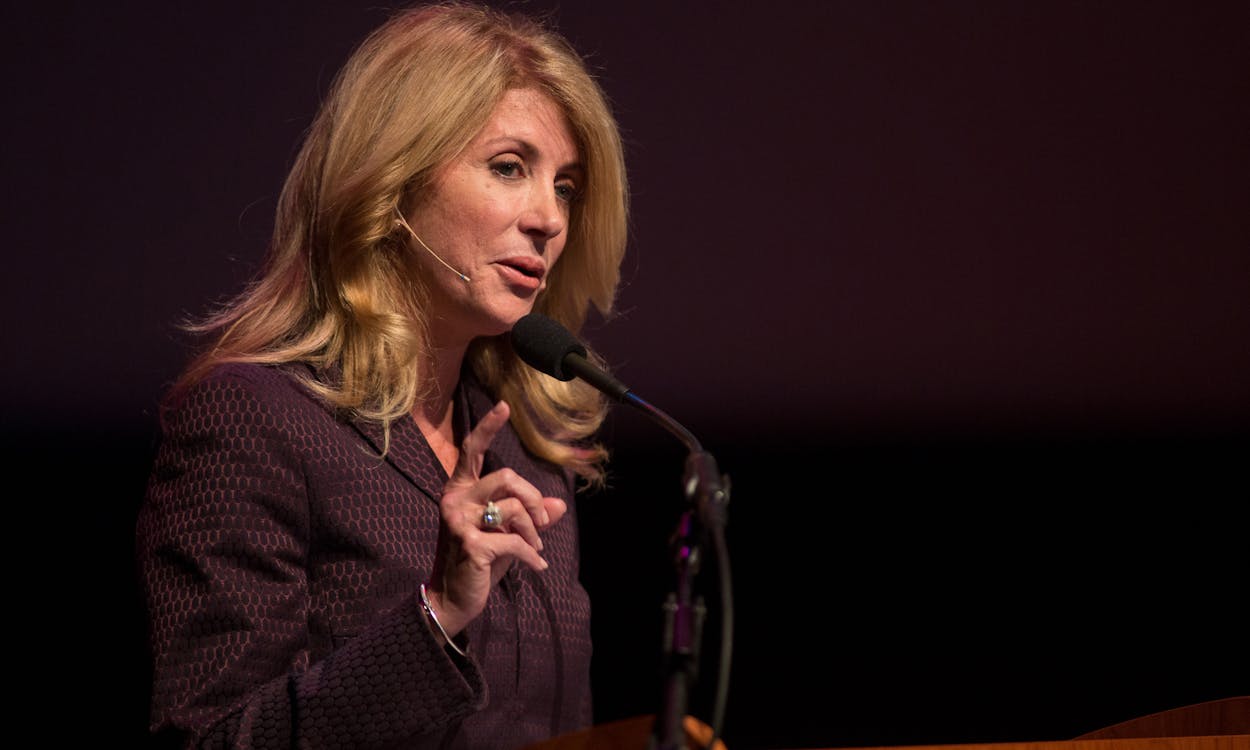After an extended period of radio silence following her failed gubernatorial campaign, former Texas state Senator Wendy Davis has been crackling back to life in the past few months: NBC announced that a Davis-inspired show was in the works, she had high-profile interviews with MSNBC and Rolling Stone, and she swallowed her pride to write a Politico essay on her open carry sea change.
Perhaps it was this rekindled national attention (that’s not even mentioning what was a more-than-likely nod in Shonda Rhimes’ Scandal!) that prompted Hillary Clinton to deploy the Texas politician to drum up much-needed support for her campaign in Iowa. With the countdown until the February 1 caucus ticking down, Davis is on the ground stumping for the Democratic candidate all by her lonesome. As the Texas Tribune notes, candidates won’t send just anyone out on a solo mission, which speaks to the campaign’s confidence that Davis can draw crowds.
And that’s a pretty safe bet. Her eleven-hour filibuster of the HB 2 made her a national icon for women’s reproductive health, eventually leading to national recognition in the form of a breathless Vogue profile and, in all likelihood, causing a spike in sales of pink Mizuno running shoes. Davis became a symbol not only for Texas progressives, but reproductive health advocates around the country.
Clinton’s camp seemed to be banking on that reputation when it announced in a statement that Davis would be focusing on the candidate’s commitment to women’s health and defending against Republican attacks on Planned Parenthood.
When Davis made one of her first of seven stops around the state in Ames, Iowa, Thursday, she gushed over Clinton’s commitment to women.
What really made my jaw drop was when I saw her in 2009 appearing before the House Foreign Affairs Committee, and she was asked a question about her position and the administration’s position on reproductive rights and how she was representing that issue around the world. And without missing a beat and without shying away for a moment about what she believes so strongly was important in terms of reproductive rights and family planning and the empowerment that provides to women in this country and other parts of the world. She made the most profound impression on me, not only because of what she said but the strength of character and commitment with which she said it.
That would be a jaw-dropping scene to witness for a women who, despite vaulting into the national consciousness by filibustering an anti-abortion bill, dropped the word “abortion” from her vocabulary during her race to the Governor’s Mansion.
It wasn’t long after she announced her run for governor in October 2013 that Davis began noticeably skirting talk of The-Procedure-That-Will-Not-Be-Named. As Texas Monthly‘s Dave Mann noted, abortion rights were never going to be the backbone of her platform, but Davis performed Olympic-level linguistic gymnastics to avoid even using the word. On the year anniversary of her filibuster, Davis’s commemorating speech not only avoided the actual word abortion, but refocused on the idea that her efforts were aimed at taking down Austin’s political elite. At that point it went beyond semantics; she was trying to change her message.
It might have been comical if it wasn’t a complete betrayal to her supporters. Let’s be honest—even within the state, Davis wasn’t exactly a household name before she took a very public stand for women’s rights. Her entire gubernatorial run hinged on that moment and on her quickly established reputation as an abortion-rights poster child. But, in the end, political calculus trumped her true commitment to the cause, which still wasn’t enough to deliver anything close to a win over Greg Abbott.
Davis, for her part, seems to have realized this misstep. In her interview with Rolling Stone she talked about losing her voice as her campaign rolled on, further noting that she believed that “women wanted to hear more from [her] on that issue.” (read: A-B-O-R-T-I-O-N)
This could be Davis’ chance to reclaim her identity as a reproductive health champion, even if it’s done by her support for Clinton. But we all remember what ol’ Willie Shakespeare said about brevity, right? So perhaps Davis’ support would be more effective if, you know, she could just say what she means.






